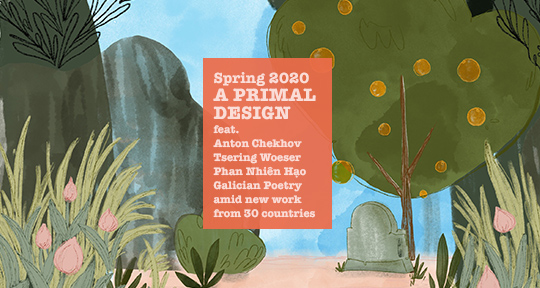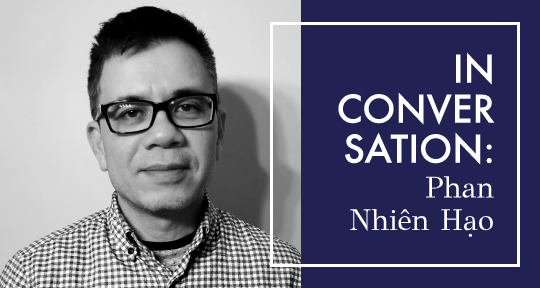Explore the grand scheme of things in Asymptote’s Spring 2020 edition “A Primal Design,” featuring poetry by Zuzanna Ginczanka and Phan Nhiên Hạo, drama from the great Anton Chekhov, Joshua Craze’s review of António Lobo Antunes’ latest fiction, and Fiona Bell’s essay on the “diva mode” of translation. Our Special Feature this season showcases Galician poetry, headlined by Chus Pato. The vivid colors of guest artist Ishibashi Chiharu set the tone for exciting new work from 30 countries and 24 languages, while Ain Bailey’s sonic art provides a fitting soundtrack!
The oracle reveals the obscure plan that drives history, and Galicia, as evoked by its poets, shimmers with oracular resonance. “Language endures / Bodies do not,” declares Gonzalo Hermo, and indeed, these verses seem meant for stone inscriptions. Lara Dopazo Ruibal’s work takes a more visceral approach: “the fig tree grows inside me while the scorpion hunts the ants coming out of my eyes.” But everywhere these poets deal in the essential, the “gold in its original depths,” as Alba Cid writes.
The primeval and the primordial abound in highlights like Matteo Meschiari’s dive into prehistory in his powerful fiction, “Red Ivory,” or Auschwitz survivor Edith Bruck’s lyrics, as immediate as they are minimal. Tareq Imam considers the sublime terror of blindness in a Borges-inspired tale, “Through Sightless Eyes”: truly we are as the blind before destiny. History, like that of Tsering Woeser’s immemorial Buddhist Tibet, provides an illusion of clarity in our confusion. Amidst all that disorientation, writes Seo Jung Hak, “Even if I scribble a poem, the absurdity like a fly who doesn’t bother to fly away somewhere is sitting on a chair like an old joke.”
As we sit quarantined in Plato’s cave pondering our collective conundrum, consider casting shadows of your own when you share news of the issue on Facebook or Twitter; as thanks, here’s a free flyer of the issue to print and share with friends!
If the work that we do touches you, consider signing up to our Book Club, or becoming a sustaining member from as little as $5 a month. We couldn’t do it without you!


